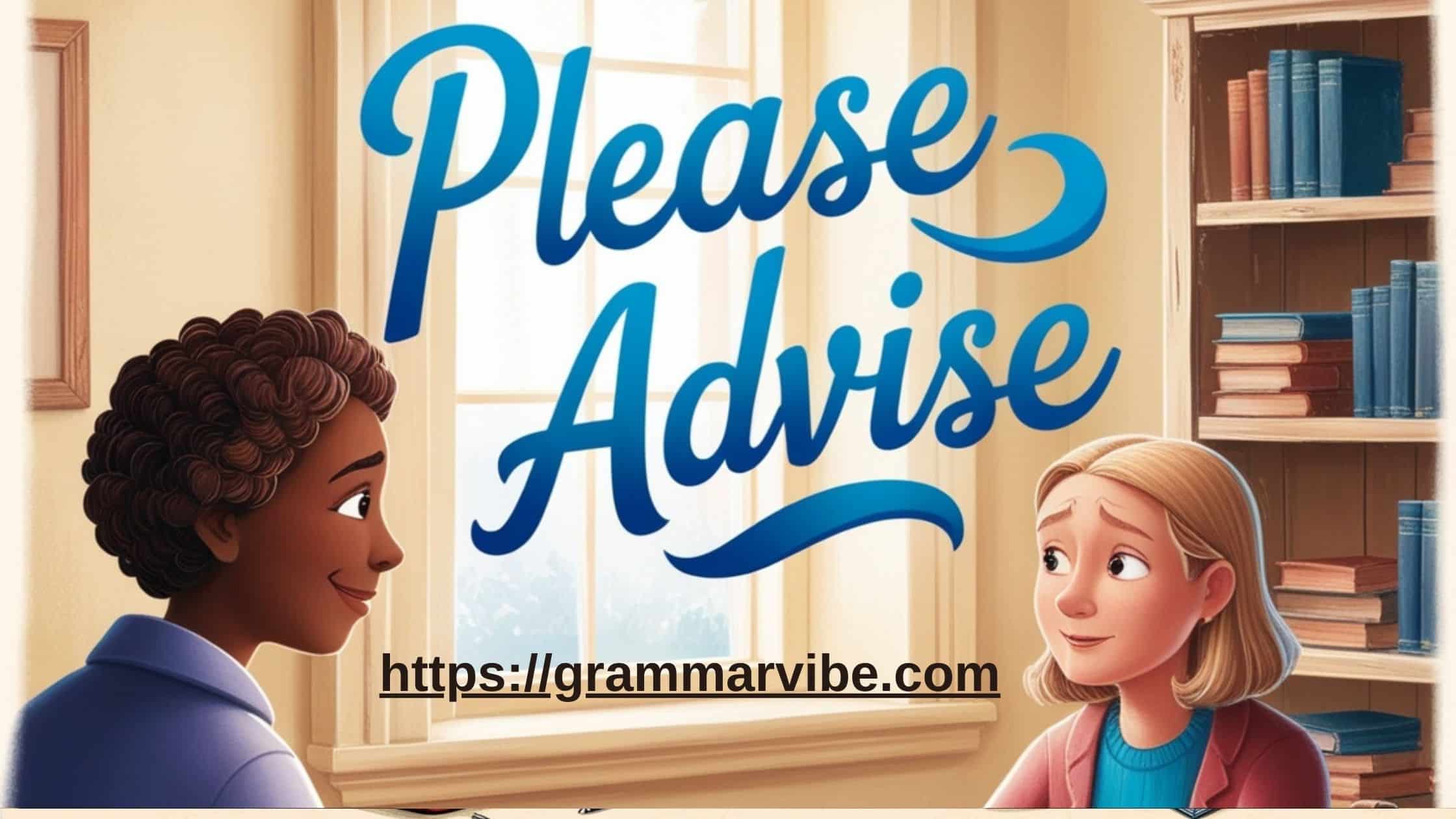When you need advice or guidance in professional communication, the phrase “please advise” is commonly used. However, it can sometimes feel a bit impersonal or overused, especially in environments where relationships are more collaborative or informal. Changing up how you ask for advice can enhance your professional communication, build stronger working relationships, and show respect to the person you’re asking for help.
Below, we explore 15 alternative phrases you can use instead of “please advise” to keep your interactions dynamic and engaging.
1. I Would Appreciate Your Guidance
This phrase is perfect for situations where you need advice but also want to convey a deeper level of respect. It shows that you value the person’s experience and insight.
Example Scenario:
You’re working on a complex project and are unsure about the next steps. You can email your colleague:
“Hi Sarah, I’m considering the next steps for the project, and I would appreciate your guidance on how to move forward. Your expertise in this area would be invaluable.”
Here, you show gratitude and a willingness to learn, positioning the person as an authority in the situation.
2. Could You Provide Your Recommendations?
This phrase is straightforward and respectful, making it a great alternative when asking for someone’s opinion in both formal and informal settings. It is commonly used in scenarios where professional input is required for decision-making.
Example Scenario:
When deciding on software to use for a new project, you might email a senior colleague:
“Hello Mark, I’d appreciate it if you could provide your recommendations for the best software to streamline our team’s workflow. Your insight would really help us make an informed choice.”
This alternative sounds professional and shows that you value their input.
3. What Would Be Your Suggestion?

This is another great way to ask for advice that feels conversational while still being respectful. It encourages the person you’re speaking to offer their viewpoint and emphasizes your willingness to consider their thoughts.
Example Scenario:
While working on a team project, you might ask:
“Hi Emily, we’re struggling with the project timeline. What would be your suggestion for getting back on track?”
This phrase demonstrates that you respect their perspective and are open to their suggestions, which is critical for fostering collaboration.
4. I’m Seeking Your Counsel on This Matter
This phrase is more formal, which makes it appropriate for high-stakes or important discussions, particularly in industries like law, medicine, or academia. It implies that the advice you seek is critical and valuable.
Example Scenario:
If you’re navigating a complex legal situation, you might say:
“Dear Robert, I’m seeking your counsel on this matter as it pertains to compliance with new regulations. Your advice will help ensure that we proceed correctly.”
This alternative reflects the importance of the guidance being sought.
5. I’d Value Your Input
If you want to ask for advice in a more informal, yet respectful way, this is a great option. It conveys that you appreciate the other person’s thoughts and that their opinion matters to you.
Example Scenario:
For a new marketing strategy, you could reach out to a colleague:
“Hi Olivia, we’re finalizing the details for our new campaign, and I’d value your input on the messaging. What do you think?”
This phrasing fosters a teamwork mentality and encourages further feedback.
More for you: 15 Other Ways to Say “Happy to Help”
6. Please Share Your Thoughts
A bit more open and inviting, this phrase suggests that you are looking for an exchange of ideas, rather than a single piece of advice. It signals a desire for dialogue.
Example Scenario:
When reviewing a proposal, you might write:
“Dear Andrew, we’ve worked through the initial draft, and I’d love it if you could share your thoughts on areas we might improve. Your feedback is highly appreciated.”
This phrasing creates an opportunity for collaboration and mutual respect.
7. I’d Be Grateful for Your Advice
A slightly more formal alternative, this phrase shows genuine appreciation for someone’s help. It works well in situations where you may not have worked together before, but you still value their professional insight.
Example Scenario:
When making a decision on a project, you might reach out:
“Hello Jennifer, I’m at a crossroads with this project, and I’d be grateful for your advice on the best approach moving forward.”
This phrase demonstrates gratitude and recognizes the value of the other person’s opinion.
8. What Is Your Take on This?
This phrase is casual and works well in more informal conversations. It’s a great way to ask for someone’s opinion while keeping the tone light and conversational.
Example Scenario:
In a brainstorming session, you could say:
“Hey David, we’ve been discussing new branding ideas for the campaign. What’s your take on the logo design so far?”
It encourages a positive engagement and highlights a desire for feedback and open communication.
For your interest: 15 Other Ways to Say “You’re Proud of Someone”
9. Could You Offer Your Opinion?
A straightforward alternative to “please advise,” this phrase invites someone to share their perspective on a situation. It works well in professional settings where formal communication is still necessary.
Example Scenario:
For a new project, you might say:
“Hi Susan, we’re putting together a proposal for the client. Could you offer your opinion on the budget estimate before we send it out?”
This phrase indicates respect for the other person’s judgment and opinion.
10. I’m Open to Your Perspective
This is a welcoming phrase that suggests you are eager to hear different viewpoints. It’s particularly effective when you want to emphasize that you value collaboration and open dialogue.
Example Scenario:
When working through a team challenge, you could email:
“Hi Tom, we’re struggling with the project deadline. I’m open to your perspective on how we can adjust the timeline to meet expectations.”
This phrase shows a collaborative approach to decision-making.
Check out this: 15 Other Ways to Say “Please See Attached” in Email
11. I’d Appreciate Your Suggestions
This phrase is a polite way to ask for recommendations, especially when you are looking for specific advice on what to do next. It implies a need for actionable insights.
Example Scenario:
For a team initiative, you might ask:
“Dear Chris, I’d appreciate your suggestions on how we can improve team dynamics during our next meeting.”
This invites teamwork and contributions appreciated as part of the process.
12. Can You Provide Your Insight?

Asking for “insight” suggests you are looking for a deeper understanding, not just surface-level advice. It implies that you respect the person’s experience and would like them to analyze the situation thoroughly.
Example Scenario:
In a professional setting, you could ask:
“Hello Liam, we’re considering expanding into new markets. Can you provide your insight into the potential challenges we might face?”
This phrase highlights the need for expert guidance and understanding.
13. What Are Your Thoughts on This?
This phrase is conversational and encourages a back-and-forth exchange. It works in situations where you want to involve the other person in the decision-making process.
Example Scenario:
During a project debriefing, you might say:
“Hi Clara, now that the project is complete, what are your thoughts on the outcomes we achieved?”
This shows that you value feedback and appreciate their perspective on the matter.
You might also like: 15 Other Ways to Say “Sounds Good”
14. I Would Be Grateful for Your Perspective
Similar to “I’d value your input,” but with an emphasis on the other person’s perspective, this phrase can be used when you want to show genuine gratitude for their help.
Example Scenario:
For a project review, you could send an email:
“Dear Peter, I would be grateful for your perspective on how we can improve the quality of our team’s performance.”
This shows that you care about their professional input and are looking for constructive ideas.
15. Could You Suggest a Course of Action?
This phrase is ideal when you’re looking for actionable advice, particularly in situations where you need to make decisions or take the next step.
Example Scenario:
When managing a project, you might ask:
“Hi Rebecca, we’ve hit a few roadblocks with the project. Could you suggest a course of action to get things back on track?”
This helps maintain project momentum and focuses the discussion on finding solutions.
Table: 15 Alternative Ways to Say “Please Advise”
| Alternative Phrase | Scenario Example |
|---|---|
| I would appreciate your guidance | Seeking advice on a project timeline. |
| Could you provide your recommendations? | Asking for feedback on software choice. |
| What would be your suggestion? | Inquiring about improving team performance. |
| I’m seeking your counsel on this matter | Requesting advice on legal compliance for a business decision. |
| I’d value your input | Looking for feedback on a new product idea. |
| Please share your thoughts | Asking for ideas to improve a work process. |
| I’d be grateful for your advice | Requesting career advice from a mentor. |
| What is your take on this? | Seeking an opinion on a new marketing strategy. |
| Could you offer your opinion? | Looking for input on a financial decision. |
| I’m open to your perspective | Wanting suggestions for improving project management. |
| I’d appreciate your suggestions | Asking for ideas to improve team dynamics. |
| Can you provide your insight? | Seeking professional input on market expansion. |
| What are your thoughts on this? | Requesting feedback on a completed project. |
| I would be grateful for your perspective | Looking for guidance on improving leadership skills. |
| Could you suggest a course of action? | Asking for recommendations on resolving an ongoing project issue. |
Conclusion
In professional settings, it’s important to communicate effectively and respectfully. By using the alternatives to “please advise” listed above, you can foster more meaningful dialogues, collaboration, and strong working relationships. Not only does this help you build rapport, but it also shows that you value the other person’s insight, perspective, and contributions. Whether you are seeking guidance from a mentor, requesting recommendations from a colleague, or inviting feedback from your team, these phrases can make a big difference in your professional communication.

Kyren Paul is an experienced blogger and the creative mind behind “Grammar Vibe.” With a passion for the nuances of English grammar, he brings clarity and insight to everyday language topics, making grammar accessible and engaging for readers of all levels.











Leave a Comment